英汉语篇衔接对比与翻译
英汉语篇对比与翻译
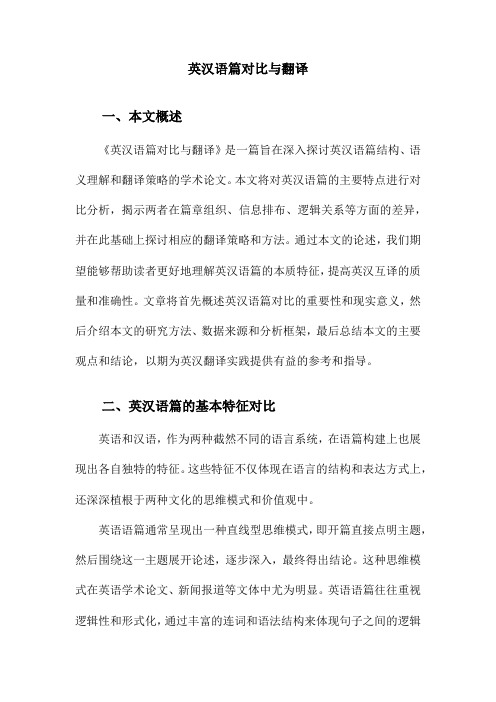
英汉语篇对比与翻译一、本文概述《英汉语篇对比与翻译》是一篇旨在深入探讨英汉语篇结构、语义理解和翻译策略的学术论文。
本文将对英汉语篇的主要特点进行对比分析,揭示两者在篇章组织、信息排布、逻辑关系等方面的差异,并在此基础上探讨相应的翻译策略和方法。
通过本文的论述,我们期望能够帮助读者更好地理解英汉语篇的本质特征,提高英汉互译的质量和准确性。
文章将首先概述英汉语篇对比的重要性和现实意义,然后介绍本文的研究方法、数据来源和分析框架,最后总结本文的主要观点和结论,以期为英汉翻译实践提供有益的参考和指导。
二、英汉语篇的基本特征对比英语和汉语,作为两种截然不同的语言系统,在语篇构建上也展现出各自独特的特征。
这些特征不仅体现在语言的结构和表达方式上,还深深植根于两种文化的思维模式和价值观中。
英语语篇通常呈现出一种直线型思维模式,即开篇直接点明主题,然后围绕这一主题展开论述,逐步深入,最终得出结论。
这种思维模式在英语学术论文、新闻报道等文体中尤为明显。
英语语篇往往重视逻辑性和形式化,通过丰富的连词和语法结构来体现句子之间的逻辑关系,使整个篇章结构紧凑、层次分明。
相比之下,汉语语篇则更多地采用螺旋型思维模式。
在汉语表达中,作者往往先从外围入手,通过描绘背景、渲染气氛等方式逐渐引出主题。
这种思维模式在汉语文学作品、日常会话中尤为常见。
同时,汉语语篇更注重意合性,即通过语境和语义的关联来实现句子之间的衔接和连贯,而非依赖明显的连词或语法结构。
造成这种差异的原因在于英汉两种文化的不同。
英语文化强调逻辑性和客观性,注重分析和推理,因此英语语篇也呈现出一种客观、直接的风格。
而汉语文化则更注重整体性和和谐性,强调综合和感悟,因此汉语语篇更倾向于采用一种委婉、含蓄的表达方式。
了解英汉语篇的这些基本特征差异,对于提高英汉互译的质量具有重要意义。
在翻译过程中,译者需要充分考虑到两种语言在语篇构建上的不同特点,灵活运用各种翻译技巧和方法,以实现原文与译文在语义、风格和文化内涵上的对等。
语篇翻译中英汉词汇衔接手段对比分析

语篇翻译中英汉词汇衔接手段对比分析衔接是语篇连贯的重要内容,连贯的构建离不开衔接机制。
在所有衔接机制中,词汇衔接是衔接中最突出、最重要的形式。
英汉语篇中的词汇衔接手段大体相同,两者又有差异,在词汇重复上尤为明显。
英语语篇中不会过分地使用某一词汇,较多地使用同义词、近义词等其它衔接手段。
汉语中倾向使用重复手段,特别是原词重复。
英语语篇中上下义词汇项经常出现在同义语篇中,形成连贯的衔接。
它们各自的类属关系,表明各自的层次和语义;汉语由于其衔接的内隐性特点,这种上下义词汇衔接关系不如英语明显。
正确认识英汉语篇的词汇衔接手段,对翻译实践有着重要的现实意义和教学价值。
标签:连贯衔接衔接手段词汇衔接衔接是语篇产生的必要条件,是构成语篇的重要成分。
Hoey(2000)认为词汇是衔接中最突出、最重要的形式,占篇章衔接的40%。
英汉语篇分析中,应考虑词汇衔接手段的重要性。
英汉词汇衔接手段有很多共同之处,又存有各自的特点。
正确认识英汉语篇的词汇衔接手段,对翻译实践有着重要的现实意义和教学价值。
一、英汉语篇词汇衔接对比的理论框架(一)衔接与连贯(Cohesion and Coherence)连贯与衔接是语篇分析领域的两个基本观念。
连贯的研究起步较早,随着现代语言学而产生(苗兴伟,2004)。
一般认为,Halliday和Hasan(1976)的《英语中的衔接》一书的出版标志着衔接理论的创立。
在国内关于连贯和衔接的研究起步较晚。
胡壮麟(1994)的《语篇的衔接与连贯》一书推动了国内该领域的研究。
而张德禄也从衔接力、衔接机制、衔接形式和意义等方面深入探讨了语篇的衔接功能,对于衔接理论的发展有重要意义。
在语篇分析时,有必要区分连贯与衔接这两个概念(Hoey,2000;Halliday & Hasan,1985;胡壮麟,1994;张德禄,2001)。
衔接通过语言的形式特征,即特定的语法结构和成分排列顺序等来组织概念意义和人际意义,所以它是由比较具体和直接的形式特征来体现的(张德禄,2004)。
英汉语篇衔接手段翻译策略及译文连贯性探讨

认 为 ,语 篇 内部 的 衔 接 关 系 通 过 五 种 语 言 形 式 来 实 现 :指 的相 对 集 中 ,才 能保 证 语 篇 的主 题 和 语 义 场 取 得 统 一 ” 。 称 、 省 略 、 替 代 、 连 接 、词 汇 。虽 然 以上 五 种 衔 接 手 段 在 ( 状 麟 , 19 )这 一 点对 于 英语 和 汉 语 语篇 都 很 重 要 。 胡 94
在 不 影 响 译 文 语 篇 连 贯性 和 可 读 性 的 前 提 下 ,将 译 文 中的衔接方式 一 对 应 地 译 出 ,可 以在 最 大 程 度 上 反 映 出
2 1 .9 O 2 O
语 言应 用研 究
i mpl1 cati l f t g1 bal eco10g Si OIS ‘ 0r he o Y nce the
传 统 翻 译 观 以句 子 为 翻 译 的 基 本 单 位 , “ 重 研 究 注 源 语 与 目的语 之 间 的 异 同及 言 内关 系 ,将 翻 译 过 程 视 为把
一
种 文 字 材 料 转 换 成 另 一 种 文 字 材 料 ,把 一 种语 言 产 物 在
保 持 内容 ( 题 )不 变 的情 况 下 改 变 成 另 一 种 语 言 产 物 的 命 过程 ” ( 美 芳 、 黄 国文 ,2 0 ) 。 随 着 篇 章 语 言 学 的 兴 张 02
地 将 语 篇 分 析 延 伸 到 其 他 领 域 ,这 自然 也 包 括 翻 译 领 域 。 李 运 兴 认 为 “ 译 活 动 所 处 理 的 不 是一 个 个 孤 立 的词 句 , 翻
英汉照应的语篇衔接手段对比与翻译

28 ・
维普资讯
一
有 时人 们需 要从 语篇 之外 来 寻找某 一指 代成 分 的所
指 对 象 , 时人 们则 需 要 从 语 篇 内部 来 寻找 指 代 成 有 分 的所指 对象 。从 语 用 功 能 的 角 度 来 看 , 应可 以 照
分 为两种 :外指 ( xp oa 和 内指 ( n o h r) eoh r ) ed p oa 。外
、
照应
指 照应指 的是语篇 中某 个 成分 的参 照点 不在语 篇 本 身 内部 , 是存 在 于语 境 中 。 内指 照 应指 的是语 言 而 成 分 的 参 照 点 存 在 于 语 篇 上 下 文 中 。H ld ya d a ia n l
H sn 17 3 ) 出 , 论是 外 指 照 应 还 是 内指 照 aa ( 9 6:3 指 无
语 篇理 论对 翻 译 的 影 响 一 直 是个 热 门话 题 , 这
案 , 就 产生 了照 应关 系 ( ldyad H sn 17 这 Ha ia n aa ,9 6: l 3) 1 。更 确 切 地 说 , 是 语 篇 中 的 指 代 成 分 (e r 它 rf . e ec e 与指称 或 所 指 对象 (e rn) 间 的相 互 n ei m) t r ee t 之 f 解 释关 系 。照应指 用代 词等 语法 手段 来表 示 的语义 关 系 , 语篇 中某 一 语 言 成 分 和 另一 语 言 成 分之 间 是 在指 称 意义 上 的相 互解 释 的关 系 , 即 以一 个成 分 也
此衔 接 。 衔接 是语 篇 的一个 重要 特 征 。语 篇 是 自然语 言 语 义上 的一 个 统 一 体 , “ 何 不 完 全 受 句 子 语 法 是 任 约 束 的在 一 定 语 境 下 表 示 完 整 语 义 的 自然 语 言 ” ( 壮 麟 ) H ldy等 认 为 :衔 接 是 一 个 语 义 概 胡 。 a ia l 念, 指语 篇语 言 成分 之 间的语 义联 系 , 当语 篇 中的某
基于英汉语篇衔接手段对比的汉译英翻译策略研究
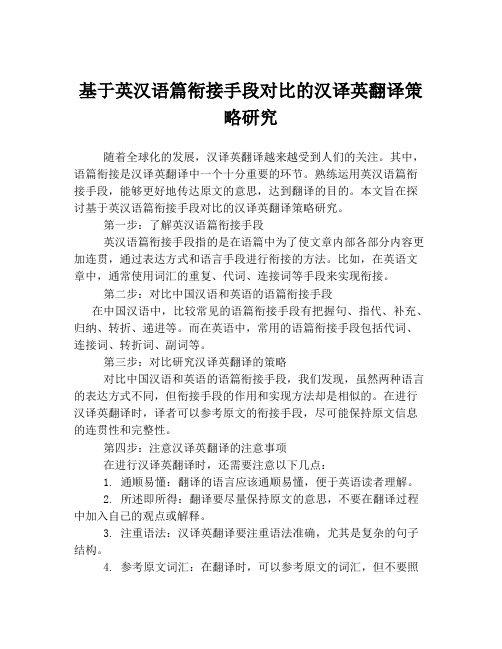
基于英汉语篇衔接手段对比的汉译英翻译策略研究随着全球化的发展,汉译英翻译越来越受到人们的关注。
其中,语篇衔接是汉译英翻译中一个十分重要的环节。
熟练运用英汉语篇衔接手段,能够更好地传达原文的意思,达到翻译的目的。
本文旨在探讨基于英汉语篇衔接手段对比的汉译英翻译策略研究。
第一步:了解英汉语篇衔接手段英汉语篇衔接手段指的是在语篇中为了使文章内部各部分内容更加连贯,通过表达方式和语言手段进行衔接的方法。
比如,在英语文章中,通常使用词汇的重复、代词、连接词等手段来实现衔接。
第二步:对比中国汉语和英语的语篇衔接手段在中国汉语中,比较常见的语篇衔接手段有把握句、指代、补充、归纳、转折、递进等。
而在英语中,常用的语篇衔接手段包括代词、连接词、转折词、副词等。
第三步:对比研究汉译英翻译的策略对比中国汉语和英语的语篇衔接手段,我们发现,虽然两种语言的表达方式不同,但衔接手段的作用和实现方法却是相似的。
在进行汉译英翻译时,译者可以参考原文的衔接手段,尽可能保持原文信息的连贯性和完整性。
第四步:注意汉译英翻译的注意事项在进行汉译英翻译时,还需要注意以下几点:1. 通顺易懂:翻译的语言应该通顺易懂,便于英语读者理解。
2. 所述即所得:翻译要尽量保持原文的意思,不要在翻译过程中加入自己的观点或解释。
3. 注重语法:汉译英翻译要注重语法准确,尤其是复杂的句子结构。
4. 参考原文词汇:在翻译时,可以参考原文的词汇,但不要照搬照抄,应该考虑到英语的表达方式和语言习惯。
总结:本文主要探讨了基于英汉语篇衔接手段对比的汉译英翻译策略。
通过对两种语言的衔接手段进行对比,我们可以更好地理解语言交流中的表达方式和方法,并且通过掌握汉译英翻译的技巧和注意事项,提升翻译质量,更加准确地传达原文的意思。
英汉语篇语法衔接手段对比及其翻译策略

- 224 -校园英语 /英汉语篇语法衔接手段对比及其翻译策略沈阳医学院/刘茹【摘要】语篇研究的核心是语言衔接,衔接手段分为词汇衔接和语法衔接。
硬干语篇语法衔接手段既有相似性,又有差异性。
本文主要探讨英汉语篇语法衔接手段的对比和英汉语篇语法的翻译策略。
【关键词】英语篇语法 衔接手段 对比一、语篇的衔接韩礼德和哈桑将衔接手段分为替代、省略、照应、连接和词汇衔接五类,前四类属于语法衔接手段。
语篇是指一个语义完整、不对长度有要求的书面语或者口语的段落。
语篇的衔接就是利用各种衔接手段将语篇结合在一起,以达到一定的交际目的,有效的语篇衔接手段决定了新组成的语篇的完整性和连续性。
现如今,语篇理论也被大量应用于翻译研究中,由于语篇理论在翻译研究中的有效应用,使得翻译单位开始由词语、句子转移到了语篇中去,因此,语篇的有效衔接在英汉翻译中发挥着至关重要的作用。
二、英汉语篇语法衔接手段的对比英语和汉语都具有各自的语法系统,在英汉互译中甚至还有语法上的冲突,也就是说,英汉语篇语法衔接手段各有不同,但是衔接手段的使用方式、使用频度和使用范围也都各有千秋。
1.替代。
替代是指用一个词去代替另一个或几个词,替代不仅有效避免了表达上的重复,而且还使得语篇更加紧凑。
替代分为从句替代、名词性替代和动词性替代。
(1)从句替代。
从句替代就是指替代整个从句,英语中主要用if not 或者if so 代替条件从句,用not 或者so 替代充当宾语的that 从句,汉语中常用如此、然代替从句。
但是汉语中从句替代词的使用频率远低于英语中从句替代词的使用频率。
(2)名词性替代。
名词性替代是指用替代词代替名词或者名词词组的中心词,英语中常用one,ones 等词作为名词的替代词,而汉语中则没有固定的名词替代词。
(3)动词性替代。
动词性替代是指用替代词代替谓语动词,英语中常用动词do 和替代句型sb+be/will/have/do+主语和so+主语+be/will/have/do 来实现替代,干、弄等词可以看做是汉语中的动词替代词,汉语中的动词替代词的使用频率低于英语中的动词替代词。
英汉语篇衔接对比与翻译策略

有 差异 , 正如 不 同文 化 有不 同 的语 用 原 则 。但 是 英 、 汉语 言在 社交应 酬 和人际关 系 方面 的语 用差 异 , 恰 是我 们 高 恰 职 高专学生 在外语 学 习 中应 该 掌握 的基 本社 交 知识 。
Байду номын сангаас
诸 多 的策 略 。 关 键 词 : 汉 对 比及 翻 译 ; 篇 意识 ; 语 学 习 英 语 英 中图 分 类 号 : 7 2 G 1 文献标志码 : A 文 章 编 号 :0 8— 7 4 2 1 ) 1 0 7— 3 10 6 1 (0 0 0 —0 8 0
语 篇 意识是 指在 翻译 过 程 中学 生 能够 利 用 语 篇分 析 的方 法准 确地传 达英 汉语 原 文 中原 作 者 欲 表 达 的 完整 意
教 学研 究。
问来 人有何 事 。这 就 是一 个 结 构 完 整 、 能 明确 、 义 清 功 语
晰 的语篇 。
是一条 重要 的经验 和准 则 。
3 探讨英 汉对 比语 用学 的应 用前 景
的。其研究 不但 可 以 完 善 和 丰富 对 比语 言 学 、 用 学 、 语 跨
文化交际学的基本理论, 拓宽其研究实践 , 而且可以增强 人们跨文化交际意识 , 提高跨文化交际能力, 减少跨文化
4 结语
[] 1 邓炎 昌. iee csi ut [ ] 英语学习 9 1 ( ) Df rn e ncs msJ . f o , 8 ,4 . 1 [] 2 胡文仲. 文化差异种 种 [ ] 教学研究 ,95,3 . J. 18 ()
交 际 中的语 用 失误 ; 进 跨 文 化 人 际交 流 、 文 化组 织交 促 跨
英汉语篇对比与翻译

这是一篇报刊文章,译文风格不宜太口语化, 还要掌握政治用语的分寸,使译文尽量符合汉 语的习惯。同时,原文中划底线语句的译文也 要 根据上文语境和大语篇的提示 准确理解后 才能译出来
狭义语篇语境 ( 即上下文 ) 明确了原文中 “ it ” 、 “ these & men ” 的实际所指: “ guarantee Ronald Reagan's resounding
more healthy.(虚拟条件)
英语的意合
C.形式词被简约后构成的意合句 I don’t know exactly (that) he is a professor. How many students (whom) do you think will
succeed in this test? There is no breeze (which) came through the
译例
It should have been easy . These were battle-tested veterans with long ties to Reagan and even longer ones to the Republican Party, men who understood presidential polities as well as any in the country. The backdrop of the campaign was hospitable , with lots of good news to work with : America was at peace , and the nation's economy, a key factor in any election, was rebounding vigorously after recession. Further more, the campaign itself was lavishly finaced , with plenty of money for a topflight staff , travel , and television commercials . And, most important, their candidate was Ronald Reagan, a president of tremendous personal popularity and dazzling communication skills . Reagan has succeeded more than any president since John F. Kennedy in projecting a broad vision of America ---a nation of renewed military strength , individual initiative , and smaller federal government.
英汉语篇的衔接、连贯与翻译
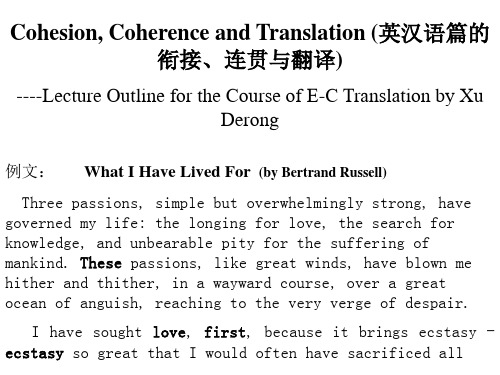
world of loneliness, poverty, and pain make a mockery of what human life should be. I long to alleviate this evil, but I cannot, and I too suffer. This has been my life. I have found it worth living, and would gladly live it again if the chance were offered me. 思考:衔接与连贯已经成为判断文章优劣的标准之一.是什么使罗 素的这篇序言一气呵成,气势磅礴?不可否认,除了伟大的思想之 外,衔接手段的自觉而又自然地运用扮演了重要的角色. Part Ⅰ . 1. 什么是语篇的衔接? Cohesion refers to the structural and/or semantic relationships holding between the different elements of a text. For example: Paris? I've always wanted to go there. The link (called anaphora) is between Paris and there.
2.1.2. Substitution 译例: A: Will we get there on time, B: I think so. 甲:我们能准时到达吗? 乙:我想能. 能 2.1.3. Ellipsis Its effect is "to create cohesion by leaving out…what can be taken over from preceding discourse"(Halliday and Hasan, 1976:196) Example: Because Alice won't (dust the furniture), Mary has to dust the furniture.
英汉标点符号的语篇衔接功能对比及其翻译技巧——以逗号、破折号为例

英汉标点符号的语篇衔接功能对比及其翻译技巧——以逗号、破折号为例贺桂华;胡仕贵;龙丽丽【摘要】As an indispensable part of written text, punctuation marks are important in discourse cohesion. Correct understanding of punctuationsnot only helps us to understand the source language accurately but also properly express the target language with appropriate translation strategies and skills. Under the guidance of Textual Linguistics, this paper compares and analyzes the textual cohesive functions of English and Chinese comma and dash through comparisons and exemplifications. And then it explores their translation strategies.%作为书面语不可或缺的组成部分,标点符号具有重要的语篇衔接功能。
在翻译中,对标点符号的正确解读可以帮助我们准确理解原文,也有助于我们采取适当的翻译策略、技巧准确地表达译文。
文章在篇章语言学理论的指引下,采用对比分析、实例结合的方法,对英汉逗号、破折号的语篇衔接功能进行对比分析,并探讨其翻译策略和变通技巧。
【期刊名称】《邵阳学院学报(社会科学版)》【年(卷),期】2011(010)006【总页数】3页(P82-84)【关键词】标点符号;语篇衔接功能;翻译策略【作者】贺桂华;胡仕贵;龙丽丽【作者单位】怀化学院外语系,湖南怀化418000;怀化学院外语系,湖南怀化418000;怀化学院外语系,湖南怀化418000【正文语种】中文【中图分类】H059作为文字语言的辅助,标点符号具有重要的语篇衔接功能。
英汉照应的语篇衔接手段对比与翻译
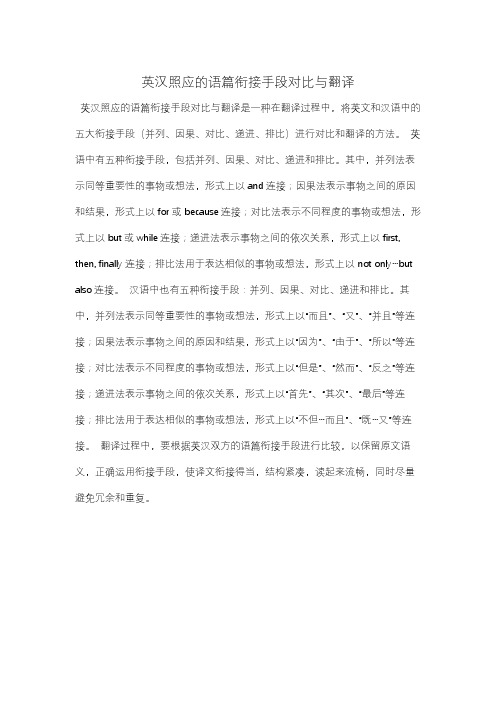
英汉照应的语篇衔接手段对比与翻译
英汉照应的语篇衔接手段对比与翻译是一种在翻译过程中,将英文和汉语中的五大衔接手段(并列、因果、对比、递进、排比)进行对比和翻译的方法。
英语中有五种衔接手段,包括并列、因果、对比、递进和排比。
其中,并列法表示同等重要性的事物或想法,形式上以and连接;因果法表示事物之间的原因和结果,形式上以for或because连接;对比法表示不同程度的事物或想法,形式上以but或while连接;递进法表示事物之间的依次关系,形式上以first, then, finally连接;排比法用于表达相似的事物或想法,形式上以not only…but also连接。
汉语中也有五种衔接手段:并列、因果、对比、递进和排比。
其中,并列法表示同等重要性的事物或想法,形式上以“而且”、“又”、“并且”等连接;因果法表示事物之间的原因和结果,形式上以“因为”、“由于”、“所以”等连接;对比法表示不同程度的事物或想法,形式上以“但是”、“然而”、“反之”等连接;递进法表示事物之间的依次关系,形式上以“首先”、“其次”、“最后”等连接;排比法用于表达相似的事物或想法,形式上以“不但…而且”、“既…又”等连接。
翻译过程中,要根据英汉双方的语篇衔接手段进行比较,以保留原文语义,正确运用衔接手段,使译文衔接得当,结构紧凑,读起来流畅,同时尽量避免冗余和重复。
形合意合视角下的英汉语篇衔接转换对比及翻译——以廖美珍教授译作《在亚当之前》为例

形合意合视角下的英汉语篇衔接转换对比及翻译———以廖美珍教授译作《在亚当之前》为例张学津(武汉工程职业技术学院 湖北 武汉:430080)摘 要 英语重“形合”,汉语重“意合”。
由于形合意合的差异英汉两种语言在语篇衔接手段上也有所不同。
在简单介绍语篇衔接手段之后,从形合意合的角度对比分析了Before Adam与廖美珍教授译本在语篇衔接的转换及翻译。
关键词 形合;意合;语篇衔接;廖美珍;在亚当之前中图分类号:H315.9 文献标识码:A 文章编号:1671-3524(2019)01-0045-03 收稿日期:2019-01-08 作者简介:张学津(1982~),女,笔译硕士,讲师.E-mail:zhxj@wgxy.net1 形合与意合 英语属于印欧语系,汉语属于属于汉藏语系,不同语系的语言造就了丰富多彩的语言世界,也给译者带来了诸多阻碍。
要成功地做到英汉两种语言的对等翻译,首先要了解英汉两种语言的差异,而形合与意合则是英汉两种语言的最大差异之一。
形合(Hypotaxis)是指语篇衔接借助连词、关系词或词汇形态变换等手段来实现或梳理词语与句子甚至整个文章的内在逻辑关系。
英语重形合即注重语句形式上的接应,其特点是有着丰富的语言形态、鲜明的词语分类、严明的主谓机制、分句沿着主句不断延伸,句子之间通过连接词、关系词层层叠叠的形成树状结构。
意合(Parataxis)是指语篇衔接通过助词或语句本身的意义与内在逻辑关系来实现。
汉语重意合即着重行文意义上的连贯、重语感变通、组合句子的自由度很大,汉语句子不像英文句子那样层层叠叠,它的每个句子长短不一,不刻意寻求形式的整齐,借助助词将事情的先后顺序逻辑关系逐层铺开,像竹子形状一节一节的接下去。
例如:英文:An 60-year-old Englishman who could notspeak Chinese and didn’t know anything about Chinawas once traveling in China.这是一个典型的树状结构的英语形合句,An60-year-old Englishman was once traveling inChina是主句,用who关系代词将整个句子衔接起来,结构严明。
英汉语篇中照应衔接手段对比与翻译

Yo n
We/u 0 H e/hm i S e/hr h e Te h v/te hm I t
你( ) 们
我 们 他 她 他, 它, 她, 们 它
衔接 手 段 大致 分 为 语 法衔 接手 段 和 词 汇 衔 接手 段 两 种 。 语 法
1 英 汉 人 称 代 词在 表 达 和 形 态 上不 同 . 英 语 大部 分人 称 代 词 的“ ”“ ” “ ” 性 、数 、格 是用 形 态 变 化 来 表 示 的 。 汉语 在 表 示 复数 意义 时 要 加上 “ ” 们 字或 数 量 词 . : 如 “ 我们 ” “ 、 他们 ”“ 、她俩 ”“ 们 三 个 ” 等 。 语人 称 代 词 没 有 、我 等 汉
律 , 图从 对 比 语篇 语 言 学的 角度 丰 富翻 译 理 论 及 实践 。 力
关 键词 : 篇 ; 接 ; 应 衔接 ; 译 语 衔 照 翻
一
、
引 言
间建 立 起 语 义 联 系 。 表是 英 语 和 汉语 在 人 称 照应 上 的 对 比 : 下
代 词
英语
I /me
一
二 接 理 论 衔
什 么是 衔 接 呢 ? B k r 为 “ 接 是 将 语 篇 不 同部 分 联 系在 一 起 的语 法 、 ae 认 衔
从 上 表 可 以看 出来 .英语 中几 乎所 有 的代 词 和 限定 词 都 能在 汉 语 中找 到对 应 项 。 在 实 际 翻译 的 过 程 中 , 但 英语 和汉 语 在 人 称 指 称 上 还有 很 多 不 同 。他 们 的不 同点 主 要 体现 在 以下
英汉语篇照应衔接对比与语篇等效翻译
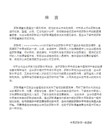
? 【2004年8级测试汉译英】
? ①在人际关系问题上我们不要太浪漫主义。②人是很有趣的,往往在接触一个人时首先看到的都是他或她的优点。③这一点颇像是在餐馆里用餐的经验。④开始吃头盘或冷碟的时候,印象很好。⑤吃头两个主菜时,也是赞不绝口。⑥愈吃愈趋于冷静,吃完了这顿宴席,缺点就都找出来了。⑦于是转喜为怒,转赞美为责备挑剔,转首肯为摇头。⑧这是因为,第一,开始吃的时候你正处于饥饿状态,而饿了吃糠甜加蜜,饱了吃蜜也不甜。⑨第二,你初到一个餐馆,开始举筷时有新鲜感,新盖的茅房三天香,这也可以叫做“陌生化效应”吧。
? You will be not only favorably impressed with the first dish or cold dishes, but also profuse in praise of the first two courses. However, the more you have, the more sober you become until the dinner ends up with all the flaws exposed. Consequently, your joy would give way to anger; your praises to criticism or even fault-finding; and your nodding in agreement to shaking the head.
他们忘记了少数服从多数,下级服从上级,局部服从全体,全党服从中央的民主集中制。
? They forget the system of democratic centralism in which the minority is subordinate to the majority, the lower level to the higher level, the part to the whole and the entire membership to the Central Committee.
英汉翻译中第三人称代词照应衔接手段对比与翻译
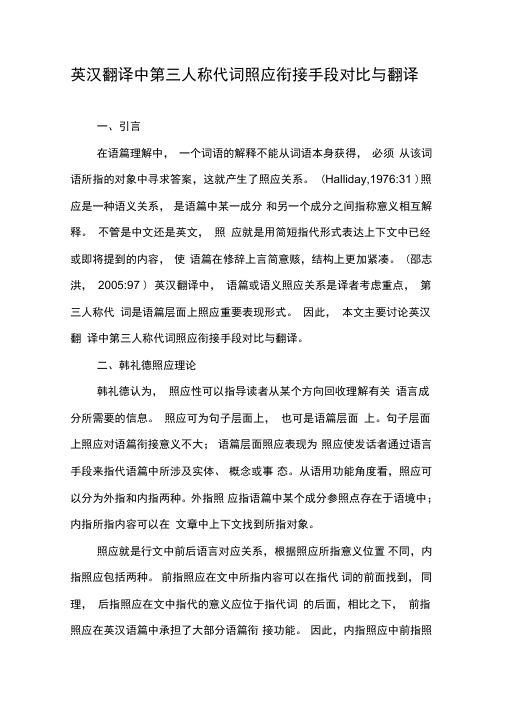
英汉翻译中第三人称代词照应衔接手段对比与翻译一、引言在语篇理解中,一个词语的解释不能从词语本身获得,必须从该词语所指的对象中寻求答案,这就产生了照应关系。
(Halliday,1976:31 )照应是一种语义关系,是语篇中某一成分和另一个成分之间指称意义相互解释。
不管是中文还是英文,照应就是用简短指代形式表达上下文中已经或即将提到的内容,使语篇在修辞上言简意赅,结构上更加紧凑。
(邵志洪,2005:97 ) 英汉翻译中,语篇或语义照应关系是译者考虑重点,第三人称代词是语篇层面上照应重要表现形式。
因此,本文主要讨论英汉翻译中第三人称代词照应衔接手段对比与翻译。
二、韩礼德照应理论韩礼德认为,照应性可以指导读者从某个方向回收理解有关语言成分所需要的信息。
照应可为句子层面上,也可是语篇层面上。
句子层面上照应对语篇衔接意义不大;语篇层面照应表现为照应使发话者通过语言手段来指代语篇中所涉及实体、概念或事态。
从语用功能角度看,照应可以分为外指和内指两种。
外指照应指语篇中某个成分参照点存在于语境中;内指所指内容可以在文章中上下文找到所指对象。
照应就是行文中前后语言对应关系,根据照应所指意义位置不同,内指照应包括两种。
前指照应在文中所指内容可以在指代词的前面找到,同理,后指照应在文中指代的意义应位于指代词的后面,相比之下,前指照应在英汉语篇中承担了大部分语篇衔接功能。
因此,内指照应中前指照应就成了照应关系和翻译方法研究重点。
Halliday 根据指代对象不同,又将照应划分为人称照应、指示照应和比较照应。
在这三种照应中,人称照应较指示照应和比较照应使用更多,对英汉翻译影响也更大。
而人称照应中第三人称代词语篇照应功能又主要体现在前指照应上,语言学又把前指照应划分为表层前指和深层前指。
表层前指,从语言学角度来讲,是由该种语言的语法和句法结构特点决定的;而由语境、语用因素控制的前指,即为深层前指。
(朱永生,2001:89 )本文从表层前指和深层前指两方面,探讨第三人称代词中英文对比分析和中英文翻译方法。
英汉语篇对比与翻译共49页

谢谢!
36、自己的鞋子,自己知道紧在哪里。弱。——拉罗什福科
xiexie! 38、我这个人走得很慢,但是我从不后退。——亚伯拉罕·林肯
39、勿问成功的秘诀为何,且尽全力做你应该做的事吧。——美华纳
40、学而不思则罔,思而不学则殆。——孔子
英汉语篇对比与翻译
6、法律的基础有两个,而且只有两个……公平和实用。——伯克 7、有两种和平的暴力,那就是法律和礼节。——歌德
8、法律就是秩序,有好的法律才有好的秩序。——亚里士多德 9、上帝把法律和公平凑合在一起,可是人类却把它拆开。——查·科尔顿 10、一切法律都是无用的,因为好人用不着它们,而坏人又不会因为它们而变得规矩起来。——德谟耶克斯
汉英语篇衔接手段对比分析与翻译——以莫言诺贝尔演讲《讲故事的人》及其英译本为例
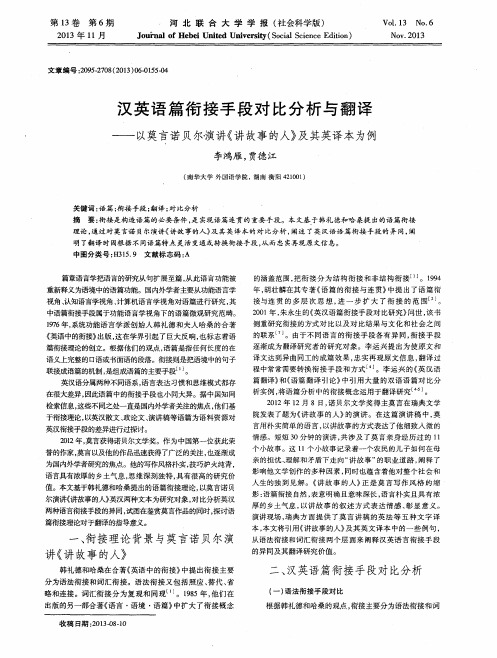
英汉语分属两种不同语系, 语言表达 习惯 和思维模 式都存
在很大差异 , 因此语篇 中的衔接手段 也小 同大异。据中国知 网 检索信息 , 这些不 同之处一直是国内外学者关注的焦点 , 他们基
于衔接理论 , 以英汉散文、 政论文 、 演讲稿等语篇为语料资源对
英汉衔接手段的差异进行过探讨。
李鸿雁 , 贾德 江
( 南华 大学 外国语学院 , 湖南 衡阳 4 2 1 0 0 1 )
关键词 : 语篇; 衔 接 手段 ; 翻译 ; 对 比 分 析 摘 要: 衔 接 是 构 造 语 篇 的必 要 条 件 , 是 实现 语 篇 连 贯 的 重要 手 段 。本 文 基 于 韩 礼 德 和 哈 桑 提 出的语 篇 衔 接
值 。本文基于韩礼德和哈桑提 出的语篇衔接理论 , 以莫言诺 贝 尔演讲《 讲故事的人》 英汉两种文本为研究对象 , 对 比分析英汉
两种语言衔接手段的异 同, 试图在鉴赏英言作品的同时 , 探讨语 篇衔接理论对于翻译的指导意义。
一
人生的独到 见解 。《 讲 故 事 的人 》 正是 莫 言 写作 风格 的缩 影: 语篇衔接 自然 , 表意明确且意味深长 , 语言朴实且具 有浓 厚 的乡土气 息 , 以讲 故事 的叙 述 方式 表达 情感 、 彰显 意义 。
1 9 7 6年, 系统功 能语言学派创始 人韩礼 德和夫人 哈桑的合著
《 英语 中的衔接》 出版 , 这 在学界 引起 了巨大反 响, 也标 志着语 篇衔接理论的创立 。根据他们 的观点 , 语篇是指任何长度的在 语义上完整的口语或书面语的段落 。衔接则是把语境中的句子
联 接成 语 篇 的机 制 , 是 组成 语篇 的 主要 手段 … 。
译文达到异曲同工的成篇 效果 , 忠实再 现原文信 息 , 翻译 过
英汉语言翻译的比较
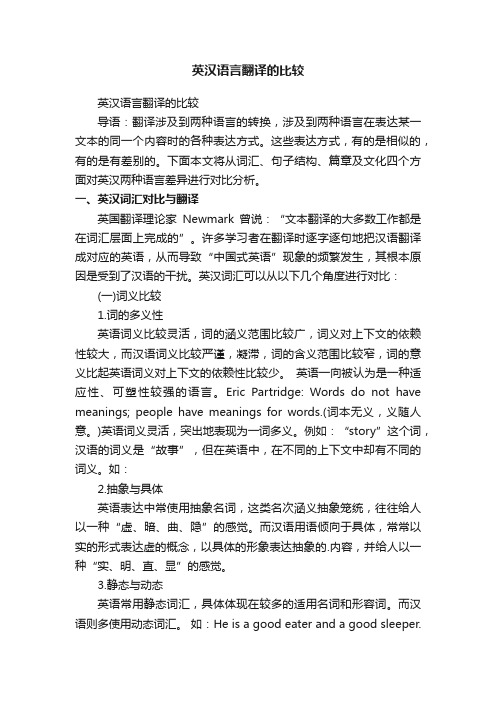
英汉语言翻译的比较英汉语言翻译的比较导语:翻译涉及到两种语言的转换,涉及到两种语言在表达某一文本的同一个内容时的各种表达方式。
这些表达方式,有的是相似的,有的是有差别的。
下面本文将从词汇、句子结构、篇章及文化四个方面对英汉两种语言差异进行对比分析。
一、英汉词汇对比与翻译英国翻译理论家Newmark曾说:“文本翻译的大多数工作都是在词汇层面上完成的”。
许多学习者在翻译时逐字逐句地把汉语翻译成对应的英语,从而导致“中国式英语”现象的频繁发生,其根本原因是受到了汉语的干扰。
英汉词汇可以从以下几个角度进行对比:(一)词义比较1.词的多义性英语词义比较灵活,词的涵义范围比较广,词义对上下文的依赖性较大,而汉语词义比较严谨,凝滞,词的含义范围比较窄,词的意义比起英语词义对上下文的依赖性比较少。
英语一向被认为是一种适应性、可塑性较强的语言。
Eric Partridge: Words do not have meanings; people have meanings for words.(词本无义,义随人意。
)英语词义灵活,突出地表现为一词多义。
例如:“story”这个词,汉语的词义是“故事”,但在英语中,在不同的上下文中却有不同的词义。
如:2.抽象与具体英语表达中常使用抽象名词,这类名次涵义抽象笼统,往往给人以一种“虚、暗、曲、隐”的感觉。
而汉语用语倾向于具体,常常以实的形式表达虚的概念,以具体的形象表达抽象的.内容,并给人以一种“实、明、直、显”的感觉。
3.静态与动态英语常用静态词汇,具体体现在较多的适用名词和形容词。
而汉语则多使用动态词汇。
如:He is a good eater and a good sleeper.他能吃又能睡。
4.构词法(1)英语主要构词法有派生、转化和合成三种,汉语主要有派生、转化、合成、重叠四种。
(2)英语派生可用于名词、动词、形容词等,汉语派生只用于名词。
(3)重叠是汉语主要构词法之一,英语则无重叠法。
汉英语篇衔接对比与翻译33页35页PPT

31、园日涉以成趣,门虽设而常关。 32、鼓腹无所思。朝起暮归眠。 33、倾壶绝余沥,窥灶不见烟。
34、春秋满四泽,夏云多奇峰,秋月 扬明辉 ,冬岭 秀孤松 。 35、丈夫志四海,我愿不知老。
61、奢侈是舒适的,否则就不是奢侈 。——CocoCha nel 62、少而好学,如日出之阳;壮而好学 ,如日 中之光 ;志而 好学, 如炳烛 之光。 ——刘 向 63、三军可夺帅也,匹夫不可夺志也。 ——孔 丘 64、人生就是学校。在那里,与其说好 的教师 是幸福 ,不如 说好的 教师是 不幸。 ——海 贝尔 65、接受挑战,就可以享受胜利的喜悦 。——杰纳勒 尔·乔治·S·巴顿
谢谢!
语篇翻译中英汉词汇衔接手段对比分析——奥巴马就职演讲词分析
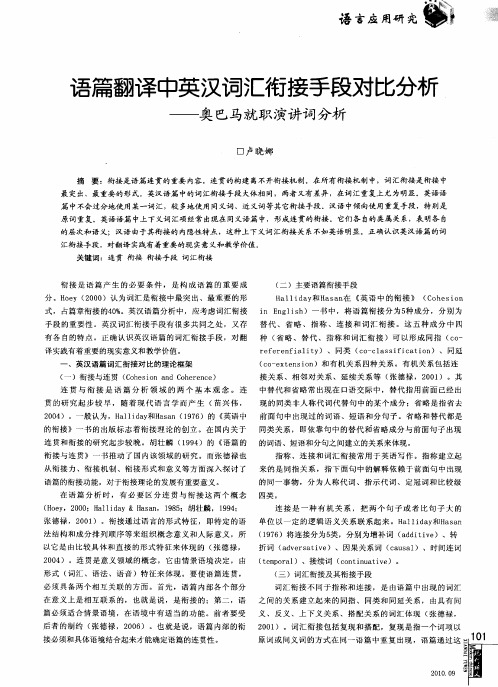
( )衔接 与 连 贯 ( o e in a dC h r n e 一 C h so n o e ec )
接 关 系 、 相 邻 对 关 系 、 延 续 关 系 等 ( 德 禄 ,2 0 ) 。其 张 01
连 贯 与 衔 接 是 语 篇 分 析 领 域 的 两 个 基 本 观 念 。 连 中 替 代 和 省 略 常 出现 在 口语 交 际 中 ,替 代 指 用 前 面 已经 出 贯 的研 究起 步较 早 ,随着 现代 语 言学 而产 生 ( 兴伟 , 苗 现 的 同类 非 人 称 代 词 代 替 句 中 的 某 个 成 分 ; 省 略 是 指 省 去
语 言应 用研 究
语篇翻译 中英汉词汇衔接手段对 比分析
奥 巴马 就职 演讲 词 分析
口卢 晓娜
摘 要 :衔接是语篇连贯 的重要 内容 ,连贯的构建 离不开衔接机制。在 所有衔接机制 中,词 汇衔接是衔接 中 最突出、最重要 的形 式。英汉语篇 中的词汇衔接手段 大体相 同,两者又有 差异 ,在词汇重复上尤为明显 。英语语 篇中不会过分地使用某一词汇 ,较多地使用 同义词 、近义词 等其 它衔接手段 汉语 中倾 向使用重复手段 ,特别是 原词重复。英语语篇 中上下义词; 项经常 出现在 同义语篇 中,形成连贯 的衔接。它们各 自的类属关 系,表 明各 自 r -
2 0 ) 。一 般认 为 ,H l ia 和 H sn ( 9 6 04 a 1 d y a a 1 7 )的 《 英语 中 前 面 句 中 出现 过 的 词 语 、 短 语 和 分 句 子 。省 略 和 替 代 都 是
的衔 接 》 一 书 的 出版 标 志 着 衔 接 理 论 的 创 立 。在 国 内 关 于 同类 关系 ,即依靠 句中 的替代和 省略成分与 前面句子 出现 连 贯 和 衔 接 的研 究起 步 较 晚 。胡 壮 麟 ( 9 4 1 9 )的 《 篇 的 的词 语 、 短语 和 分 句 之 间建 立 的 关 系来 体 现 。 语
- 1、下载文档前请自行甄别文档内容的完整性,平台不提供额外的编辑、内容补充、找答案等附加服务。
- 2、"仅部分预览"的文档,不可在线预览部分如存在完整性等问题,可反馈申请退款(可完整预览的文档不适用该条件!)。
- 3、如文档侵犯您的权益,请联系客服反馈,我们会尽快为您处理(人工客服工作时间:9:00-18:30)。
英汉语篇衔接对比与翻译【2004年8级测试汉译英】①在人际关系问题上我们不要太浪漫主义。
②人是很有趣的,往往在接触一个人时首先看到的都是他或她的优点。
③这一点颇像是在餐馆里用餐的经验。
④开始吃头盘或冷碟的时候,印象很好。
⑤吃头两个主菜时,也是赞不绝口。
⑥愈吃愈趋于冷静,吃完了这顿宴席,缺点就都找出来了。
⑦于是转喜为怒,转赞美为责备挑剔,转首肯为摇头。
⑧这是因为,第一,开始吃的时候你正处于饥饿状态,而饿了吃糠甜加蜜,饱了吃蜜也不甜。
⑨第二,你初到一个餐馆,开始举筷时有新鲜感,新盖的茅房三天香,这也可以叫做“陌生化效应”吧。
Cohesive devices 衔接手段1. reference 照应2. substitution 替代3. ellipsis 省略4. conjunction 连接5. lexical cohesion 词汇衔接----- Halliday & HasanCohesion in English重复与替代汉英两种语言的部分语篇衔接手段在使用上有所偏重,汉语更常使用原词复现和省略,而英语则更多使用照应和替代。
汉语倾向于用重复手段,而英语倾向于用替代手段。
汉语不喜欢使用同义替代的手段,因为会使精神分散;也不喜欢使用代词,因为容易变得所指不明。
结果由于强调重复,反而变成了某种意义上的“形合”。
开始吃的时候你正处在饥饿状态,而饿了吃糠甜加蜜…as you start eating you are in hunger, and when you are in hunger chaff tastes as honey…(学生译文)…as you start eating you are in hunger, when chaff tastes sweet as honey…(参考译文)他这时来了,而这时我根本想不到他会来。
He came at a time when I least expected him.那是一个寒冷潮湿的晚上,这样的晚上大部分人待在家里。
It was one of those cold, wet evenings when most people stayed at home.Vice versa 用来替代汉语两个子句意思是相对的,转折的,英语可用替代词vice versa,the other way roundE.g.We gossip about them and vice versa . (they gossip about us )为了推动中美关系的发展,中国需要进一步了解美国,美国也需要进一步了解中国。
To promote the development of China U.S. relations, China needs to know the United States and vice versa.饿了吃糠甜加蜜,饱了吃蜜也不甜1. Even chaff tastes sweet as honey when one is hungry, whereas honey doesn’t taste sweet at all when one is full. (S1)For hungry ones ordinary food becomes a delicious one as if it is mixed with honey, however when they are full, even honey will not taste so sweet. (S2)The least tasteful food taste sweet when you are hungry, while the sweetest honey tastes nothing special when you’re full. (S3)Husks will taste like honey when you are hungry, and vice versa. (参考译文)省略省略和替代一样,也是避免重复的一个常用手段。
两者常常互相替代使用。
也称作“零位替代” zero-substitution省略与英语以形合为主,汉语以意合为主的结论并不矛盾。
对英语来说,省略是形合的补充;而对汉语来说,省略是对意合的补充。
动词性省略Reading maketh a full man; conference a ready man; and writing an exact man.读书使人充实,讨论使人机智,笔记使人精确。
Histories make men wise; poets witty; the mathematics subtle; natural philosophy deep; moral grave; logic and rhetoric able to contend.读史使人明智,读诗使人灵秀,数学使人周密,科学使人深刻,伦理使人庄重,逻辑修辞之学使人善辩。
他们忘记了少数服从多数,下级服从上级,局部服从全体,全党服从中央的民主集中制。
They forget the system of democratic centralism in which the minority is subordinate to the majority, the lower level to the higher level, the part to the whole and the entire membership to the Central Committee.于是转喜为怒,转赞美为责备挑剔,转首肯为摇头。
Consequently, delight changes to anger; praise changes to blame; and nodding head changes to shaking head.Consequently, satisfaction is switched into anger, compliment into blame and fastidiousness, and nodding into shaking one’s head.Therefore, happiness turns into anger, praise into criticism, and head-nodding into head-shaking.Consequently, your joy would give way to anger; your praises would to criticism or even fault-finding; and your nodding in agreement to shaking the head. (参考译文)名词性省略正因为是一种以意合为主的语言,汉语中最常见的省略是主语的省略,而谓语的省略则较少。
申小龙(1989:196)则把汉语中主语的省略看作是“汉民族天人合一的哲学思想在语言中的表现”,因而汉语中的主语往往可以蕴涵在行为事件的主观表现中。
以汉语为母语的人的传统思维中还常常反映出某种隐性的主体意识。
隐性主体意识的典型表现是汉语中大量无主句与主语省略的运用。
(刘宓庆,1992:334)④(你)开始吃头盘或冷碟的时候,印象很好。
⑤(你)吃头两个主菜时,也是赞不绝口。
⑥(你)愈吃愈趋于冷静,(你)吃完了这顿宴席,缺点就都找出来了。
⑦于是(你)转喜为怒,(你)转赞美为责备挑剔,(你)转首肯为摇头。
Starting to eat the first dish, impression is good. It’s also very delicious when eating the first two main dishes. Having finished it all the disadvantages are found out. Then turn from happy to angry, praise to blame, yes to no. (学生译文)You will be not only favorably impressed with the first dish or cold dishes, but also profuse in praise of the first two courses. However, the more you have, the more sober you become until the dinner ends up with all the flaws exposed. Consequently, your joy would give way to anger; your praises to criticism or even fault-finding; and your nodding in agreement to shaking the head.范畴词(category words) 的省略范畴词用来表达行为、现象、属性等概念所属的范畴,是言语常用的特指手段。
英语往往避免形状、数量、性质等的同义反复。
We have winked at these irregularities too long.我们对这些越轨行为宽容得太久了。
He was described as impressed by Deng’s flexibility.据说他对邓的灵活态度印象很深。
What they wanted most was an end of uncertainties. 那时他们最渴望的就是结束这摇摆不定的局面。
圆形round (in shape)小型small (in size)少量few (in number)红色red (in color)苦味bitter (in taste)人际关系问题interpersonal relation (problem)用餐的经验dining (experience)饥饿状态in (a state) of hunger新鲜感freshness (feeling)连接人是很有趣的,往往在接触一个人时首先看到的都是他或她的优点Human beings are interesting. When it is the first time you meet a person, you only notice his or her merits. (S1)People are interesting and get the first impression of his or her merits when they communicate. (S2)People are very interesting, for when meeting somebody, they usually focus on his or her strong points. (S3)Human beings are very interesting in that when they get into contact with someone what they first see is often his or her good point only. (S4)Human beings are interesting in that they tend to first see good in a new acquaintance. (参考译文)④开始吃头盘或冷碟的时候,印象很好。
